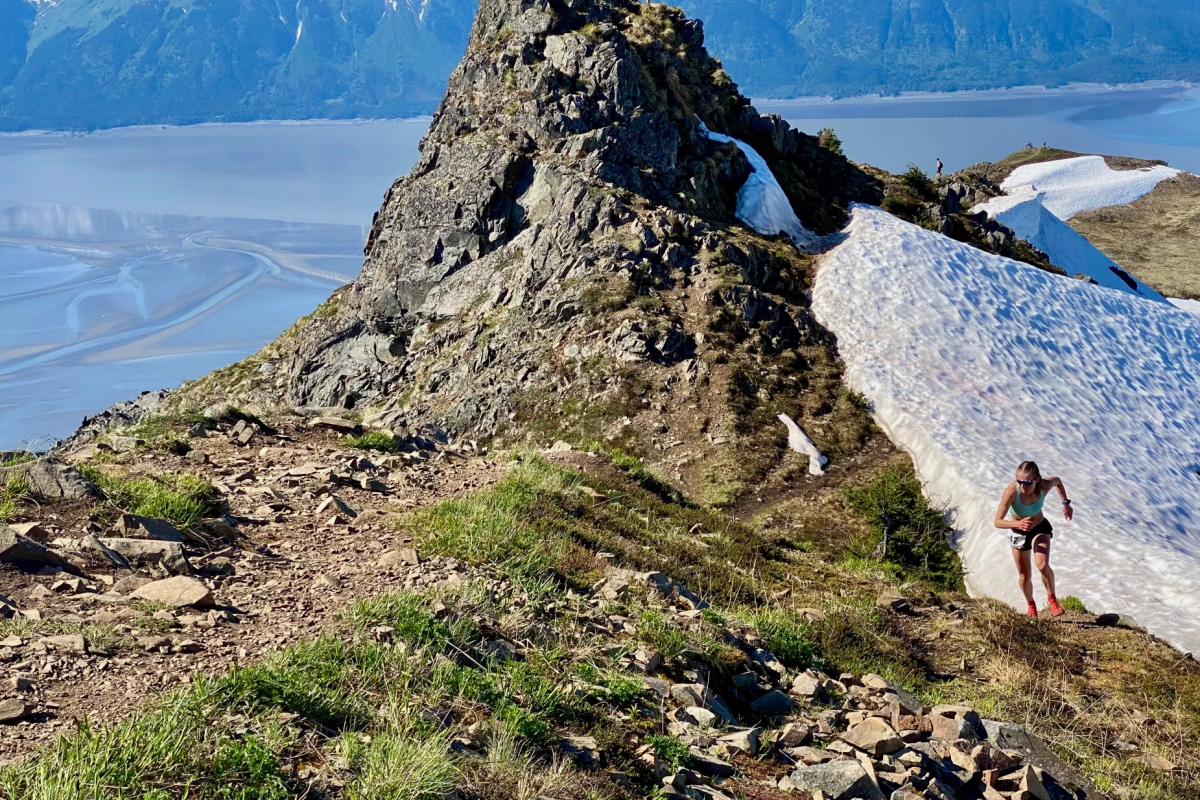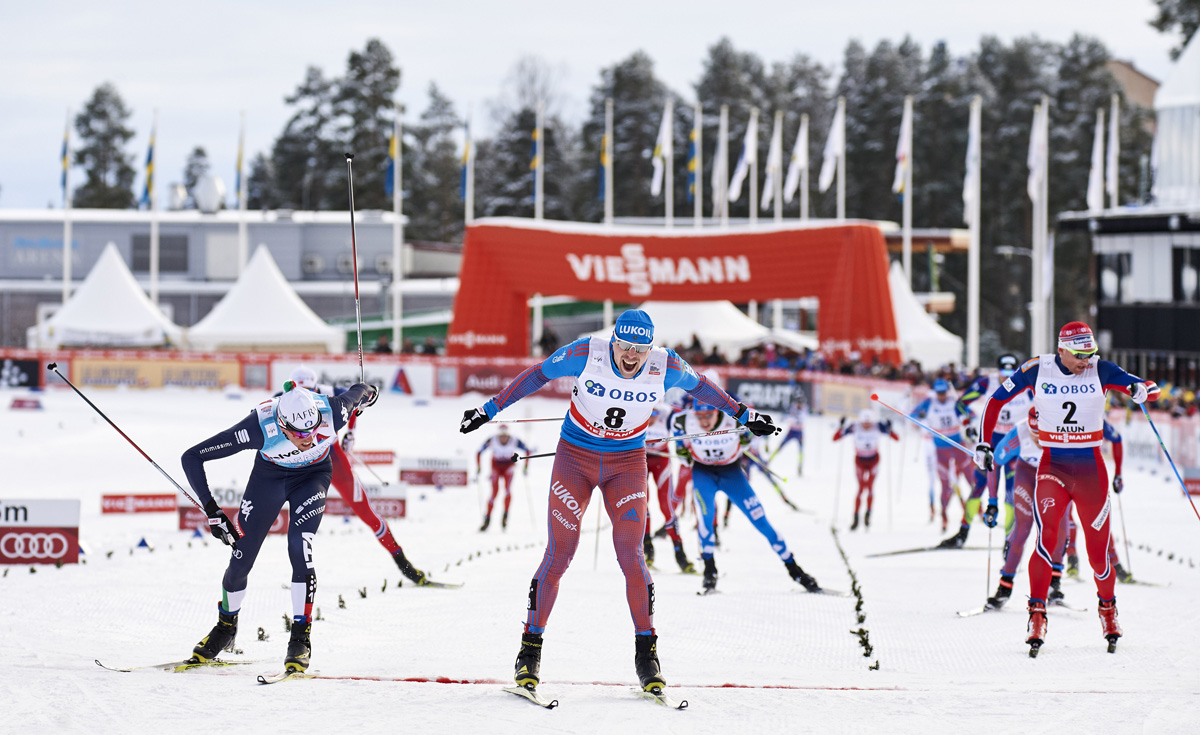
Sunday’s 15-kilometer freestyle mass start in Falun, Sweden, ended similarly to how it started: skiers sprinting en masse. One major difference, however, marked the finish line. The yellow bib of Norway’s Martin Johnsrud Sundby was not in first. Or second. The king of distance finished the day in third.
“A war,” is how the renowned distance skier, Sundby described the battle that ensued between approximately 20 competitors who were still within the lead pack coming into the finishing stretch, according to a Norwegian press release.
In the end, the 100-meter battle to the finish line left Russian sprint specialist, Sergey Ustiugov triumphant. He completed the 3 x 5 k course in a time of 31:42.5 for his first distance World Cup win.
“I’m very happy,” Ustiugov told FIS after the race. “This is a fantastic win for me because I only won in sprint … so this is amazing.”
Just 0.3 seconds back, Italy’s Francesco de Fabiani outlunged Sundby for second place by one-tenth of a second.
“The race of the day goes to Fabiani,” Canadian Devon Kershaw said during a post-race phone interview. “It’s always fun to see people that maybe other people don’t expect to come out and have a really strong sprint like that at the end. That was really cool.”
Typically stronger in classic races, de Fabiani proved his freestyle finishing kick as a force to be reckoned with on Sunday. In the last 50 meters, he propelled himself past Norwegians Finn Hågen Krogh, Niklas Dyrhaug and Sundby, moving from fifth to second place.
“I am not a sprinter like some of the others but maybe after 15 km I am fast enough,” de Fabiani told FIS.
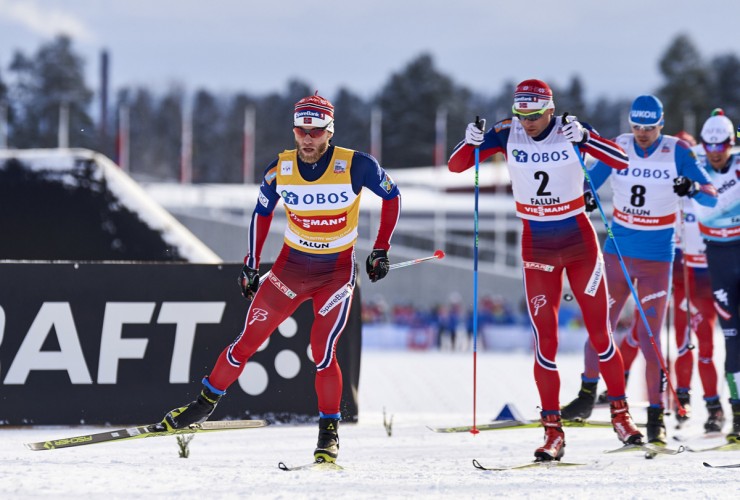
From the start of Sunday’s competition, de Fabiani raced consistently in the middle of the lead pack. It was only at the 13.2 k mark that he positioned himself among the five frontrunners.
Taking a more ‘surge-filled’ race tactic, the overall winner, Ustiugov, saw both the front of the lead group, the back of the lead group, and finally the front once again at the finish.
The Russian tied Krogh for first at the 3.2 k bonus sprint. However, by the time the skiers hit the 5 k lap, France’s Robin Duvillard had picked up the lead. With merely seconds separating them, the top-20 racers headed out for their second lap with Duvillard up front.
At 8.2 k, Sundby steamed ahead attempting to shake the field. However, as the racers rounded the final bend into the stadium, Sundby’s red suit and yellow bib were swallowed by the blue suits of the Russians. De Fabiani steadily pushed past the 10 k mark in 19th, while Sundby skied in 14th.
Emerging in first from the Russian trio was Ustiugov, leading the nordic mob into the third and final lap. However, after pushing the pace for a little over a kilometer and a half, the eventual race winner faded to the back of the pack.
Getting fewer glimpses of the lead group’s tail end by the final lap, Kershaw remained unable to close the distance between himself and the front skiers.
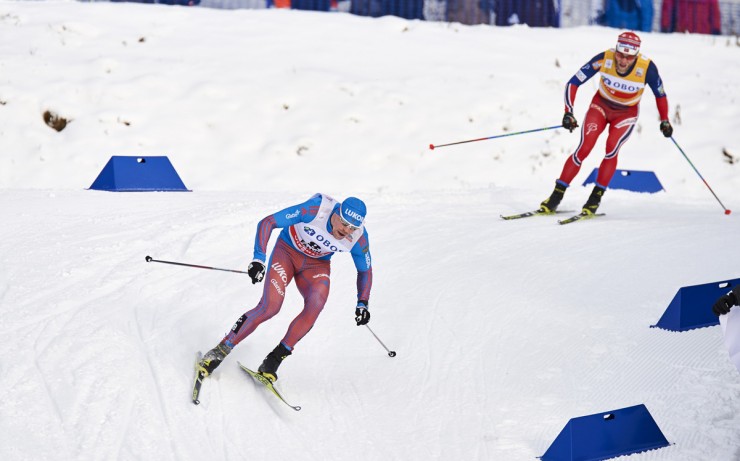
“I’d get to the back of that big lead group right when someone would change the lead and attack and then you get that accordion effect off the back,” Kershaw said.
“He just didn’t have the shape to push up to that lead group,” Canada’s head coach Justin Wadsworth said on the phone. “He was right on the back of it for a while and then it kind of started to split and he didn’t have to speed to go with them. It was kind of agonizing because they were right there.”
As Ustiugov and Sundby pressed on, Kershaw’s efforts to latch on became more difficult.
By the final climb, Ustiugov made his move around to the right of Sundby and descended into the stadium in the lead for his first distance victory.
“It is obvious that in the end of the season Russian team is getting better and better, so it is a real success,” Ustiugov told FIS.
Kershaw Top North American in 28th
Kershaw was the first North American across the line in 28th, finishing 45.1 seconds after Ustiugov. It was his second-best freestyle distance result this season, after placing 20th in the 30 k freestyle in Davos, Switzerland.
“I’m pretty disappointed with how it played out,” Kershaw said of Sunday’s race.“I got kind of caught between the big giant lead pack and then the charging back pack. I just wasn’t strong enough today to bridge the gap and stay there.”
Erik Bjornsen finished 5.2 seconds later to lead the U.S. men in 35th (+50.3).
“That was my first World Cup mass start 15km skate,” Bjornsen explained in an email. “I think there is a reason they don’t these races very often. It’s just so hectic, the whole time I felt like I was fighting for position. People were stepping all over my stuff, let’s just say there were some elbows being thrown.
“I started in 58th place which I think was a pretty big disadvantage,” he continued, referring to his bib number. “I wasn’t in position when the lead group went. I was bummed to miss the points by such a small margin. I had a small tangle with 400 meters to go that I think costed me the points today.”
At the same time, Bjornsen added he was glad to feel “back in shape” after posting a season-best 21st in Saturday’s 10 k classic.
“I hope I can ride this momentum through the Canadian Tour,” he wrote.
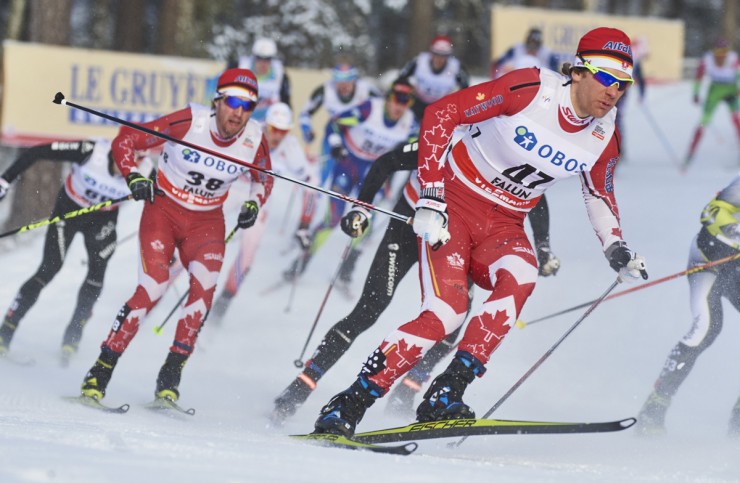
His fellow U.S. Ski Team member Noah Hoffman, who had been skiing in 17th and 18th until 8.2 k, finished in 41st, 58.9 seconds behind the winner. Simi Hamilton followed in 61st (+1:56.7) and Canada’s Graeme Killick placed 68th (+2:13.5).
“Graeme was definitely not feeling good today,” Wadsworth said. “He said he just felt heavy and tired right out of the start. He also took a crash during the race.”
Also for Canada, Alex Harvey did not feel well and sat out Sunday’s race.
“He was sick today, he was actually probably sick yesterday too,” Wadsworth said, referring to Saturday’s 10 k classic.
U.S. SuperTour leaders Scott Patterson finished 74th (+2:21.6) and Reese Hanneman 88th (+5:25.8).
“Racing was quite rough for me this weekend,” Patterson wrote in an email. “In this field if one is a couple percent off, one gets spat out the back pretty quick. Racing was quite congested but I was never really in the mix to have that matter.”
“Altogether, I will be looking to regroup, recharge, and recover for the next weekend in Lahti and the Canadian tour,” he added.
Opting out of next weekend’s World Cup races in Lahti, Finland, the Canadians will head back to Canmore to prep for the Ski Tour Canada from March 1-12.
“Everyone is going back to Canmore now. We’re skipping Lahti,” Wadsworth said of his team. “We have a bit of an altitude program there just to get everybody ready for the Tour de Canada, especially the Canmore races.”
Not only are the Canadians looking forward to returning home for the first time in a few months, but also to peak in the eight-stage World Cup Finals on their home turf.
“The season this year has been consistent for me, between 20 and 30 most races, of course, I would like to have one top 10,” Kershaw said. “So that’s the big goal for the Tour de Canada, is have one or two races that are actually standout; I’m really looking to having some of my best races at home.”
Gabby Naranja
Gabby Naranja considers herself a true Mainer, having grown up in the northern most part of the state playing hockey and roofing houses with her five brothers. She graduated from Bates College where she ran cross-country, track, and nordic skied. She spent this past winter in Europe and is currently in Montana enjoying all that the U.S. northwest has to offer.

